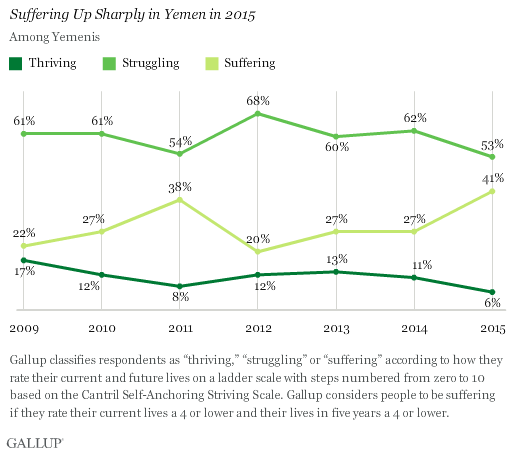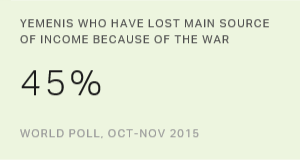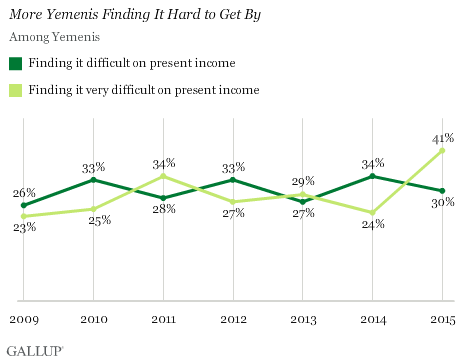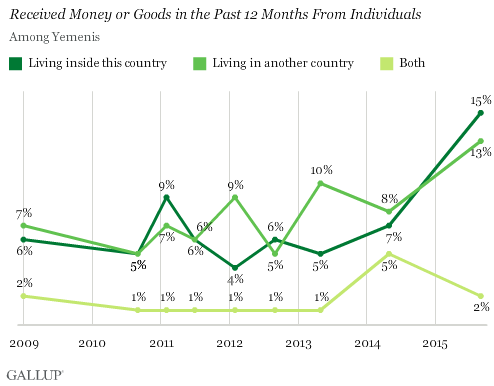Story Highlights
- Suffering jumps from 27% to 41% in one year
- 45% have lost their main source of household income
- 41% finding it very difficult to get by on their present income
WASHINGTON, D.C. -- Yemenis were no strangers to hardship before civil war broke out last year between the Houthis allied with former President Ali Abdullah Saleh and Arab ally-backed forces loyal to President Abed Rabbo Mansour Hadi. The percentage of Yemenis rating their lives poorly enough to be considered "suffering" has always been at least twice the global average every year. But in 2015, suffering jumped 14 percentage points to 41%, both a high for Yemen and one of the highest rates in the world last year.

The increase in suffering is evidence of the toll of the ongoing civil war, which has claimed thousands of civilian casualties and disrupted an unknown number of lives. Overall, about half (45%) of Yemeni adults surveyed in the fall of 2015 reported that their household had lost its main source of income because of the conflict.

The percentage of Yemenis finding it either very difficult or difficult to get by on their present household income levels also leaped in 2015. The desperation is most obvious in the increase in the number who are finding it very difficult to get by, which jumped from 24% to 41% in the same period.

This situation has made Yemenis increasingly reliant on one another and support from outside their country. Yemenis who say that their household received financial help from within or outside Yemen, or both, is up from 20% in 2014 to 30% in 2015. About one in 10 Yemenis say that they have had to rely on another outside household for food and other basic goods, and a similar percentage say the financial help they used to get before the war has been cut off.

The conflict also has driven many Yemenis from their homes and left them with nothing to go back to. Gallup selected all areas of the country for this survey initially at random, without prior knowledge of whether an area was accessible for research. Once in the field, Gallup had to replace 29% of the initially selected areas because they were either inaccessible or mostly destroyed. Even in the areas where interviewers could work, 11% of adults reported that the civil war had damaged or destroyed their homes. The full extent of the displacement is difficult to discern, but 17% of Yemenis reported that the war had displaced them from one part of the country to another.
In addition to the material resources the conflict needs to sustain it, it is also consuming human resources. Gallup data show no shortage of Yemenis who have at one time or the other took up arms during the conflict, with 17% of those interviewed saying one of their household members has done so. Such a figure may seem high, but in the context of extended familial relations prevailing in Yemen, it indicates the anxiety people feel about the conflict drawing in relatives.
Bottom Line
The successive claims of cease-fires in a civil war entering its second year have amounted to futility. Mushrooming regional tensions between Saudi Arabia and Iran have repeatedly overshadowed U.N.-sponsored peace talks between Yemen's warring factions, and the war continues to disrupt and put the lives of everyday Yemenis at risk. The findings of Gallup's recent study offer clear evidence of the human toll of a war with no end in sight -- and the costs to all. Whether they are living in areas under Houthi or government control, Yemenis are united in the heavy human cost they have had to pay.
Survey Methods
Results are based on face-to-face interviews with 1,000 adults, aged 15 and older, conducted Oct. 28-Nov. 7, 2015, in Yemen. Prior survey waves were also conducted through face-to-face interviews with 1,000 adults, aged 15 and older. For 2015 results based on the total sample of national adults, the margin of sampling error is ±3.6 percentage points at the 95% confidence level. All reported margins of sampling error include computed design effects for weighting.
Because of the the ongoing security situation, Gallup replaced 29% of Primary Sampling Units (PSUs) with similar PSUs in the same province. In addition, Gallup excluded the al-Mahra governorate and the island of Socotra because of their small size and remoteness. Altogether, roughly 30% of the population was either substituted or excluded.
For more complete methodology and specific survey dates, please review Gallup's Country Data Set details.
Learn more about how the Gallup World Poll works.
